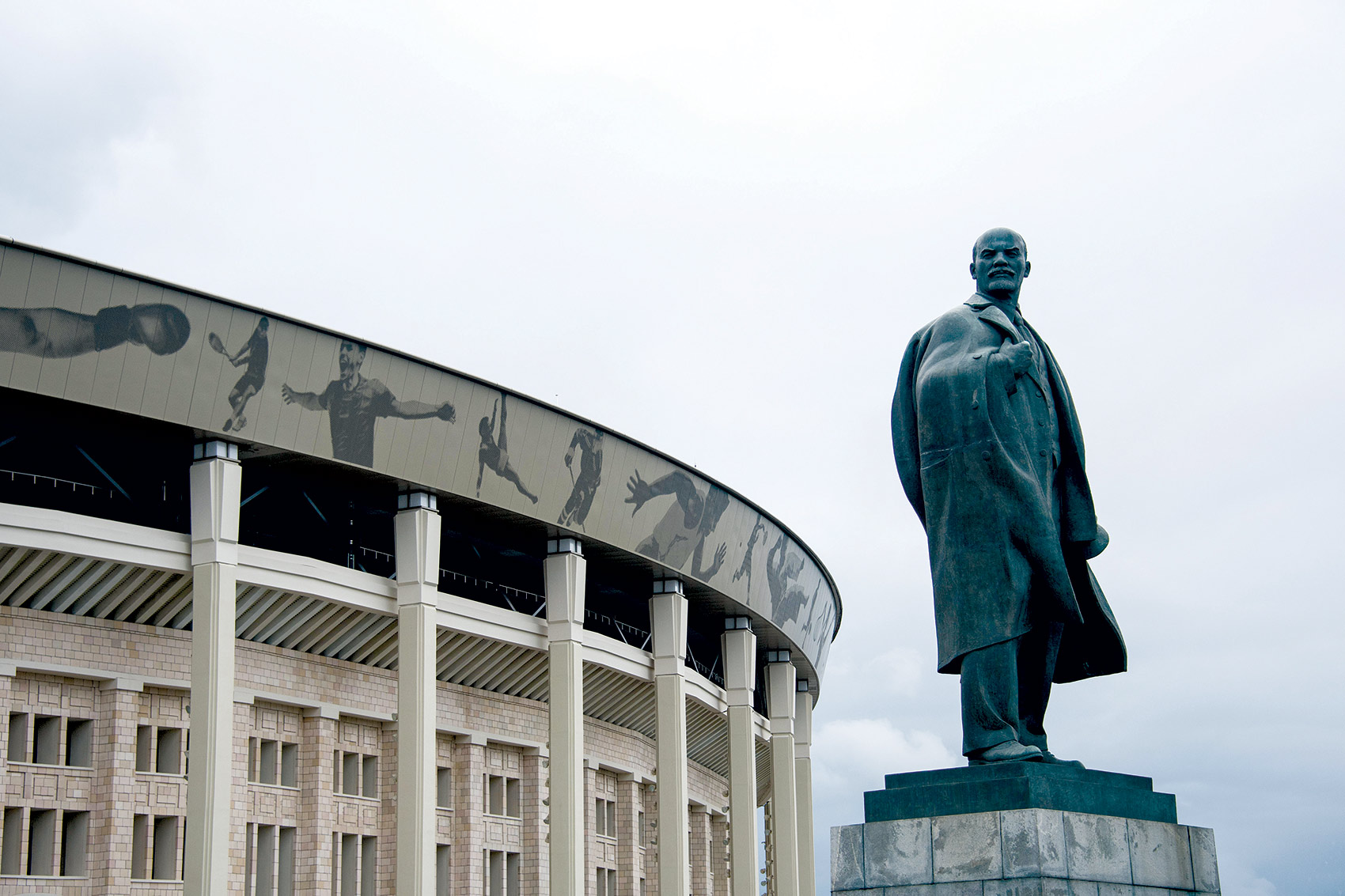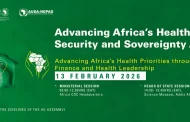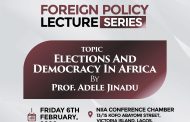Marxist-Leninist ideologues, radical activists, broad Leftists, researchers, politicians and sundry pundits are gathering at a 2-day critical celebration of Lenin’s Centenary at an International Conference in Abuja, Nigeria.
 According to the listing available to Intervention, they would be dissecting Vladmir Lenin – unarguably the chief organiser of the October Socialist Revolution which led to the now defunct Union of Soviet Socialist Block from 1917 to 1991 – from different angles, most notably “The Growth and Development of Leninism”; “Back to Lenin: A Political Introduction to Lenin and Leninism”.; “The Relevance of Marxist Theory in the Teaching of Sociology in Academic Institution”; “The Philosophical Foundations of Lenin’s Foreign Policy and its Influence on Inter-State Relations: The Post-Cold War Realities and Challenges Facing International Relations”; “Marxism-Leninism, Concrete Universality and De-colonial Epistemology in the 21st Century”; “Escaping Underdevelopment: Charting a New Pathway for Africa’s Development in Times of Neoliberalism”; “National Question and Quest for Social Change”, amongst many others.
According to the listing available to Intervention, they would be dissecting Vladmir Lenin – unarguably the chief organiser of the October Socialist Revolution which led to the now defunct Union of Soviet Socialist Block from 1917 to 1991 – from different angles, most notably “The Growth and Development of Leninism”; “Back to Lenin: A Political Introduction to Lenin and Leninism”.; “The Relevance of Marxist Theory in the Teaching of Sociology in Academic Institution”; “The Philosophical Foundations of Lenin’s Foreign Policy and its Influence on Inter-State Relations: The Post-Cold War Realities and Challenges Facing International Relations”; “Marxism-Leninism, Concrete Universality and De-colonial Epistemology in the 21st Century”; “Escaping Underdevelopment: Charting a New Pathway for Africa’s Development in Times of Neoliberalism”; “National Question and Quest for Social Change”, amongst many others.
Thinking back on leading names and actors in the theory and practice of socialist revolution has been a historical feature of Left politics in Nigeria. In recent times, it starts from the 1983 ‘Marx and Africa’ Conference at the Faculty of Arts and Social Sciences at Ahmadu Bello University, Zaria. In 2018, there was another Marx and Africa Conference in Keffi, near Abuja and now, there is the Centenary of Lenin.
While the 2018 ‘Marx and Africa’ Conference was the sharpest in terms of a leading question to which paper presenters, discussants and the audience could speak, it was the dullest in turn out, quality of debate and output. It was very much unlike the 1983 Conference during which the optimism about Nigeria was at work in terms of the seriousness and vigour on display. There is no knowing how the January 22nd and 23rd Centenary of Lenin would go in those respects at a time everyone is fearful, weary and less optimistic about what tomorrow holds. As someone commented, it is even a miracle a Centenary is being organised in Nigeria at all.
Intervention has not cited any major politicians on the listing so far available, a major contrast with the Second Republic when hardheaded intellectuals of the much referenced Kaduna Mafia -Ibrahim Tahir, Adamu Ciroma, Mahmud Tukur – were regular attendees at such conferences in Zaria, stopping only after Mallam Adamu Ciroma, for instance complained that the equally late Bala Usman was disrespectful in his reference to non-Leftists like them.
But it is not only politicians both of the Right and of the Left that are not indicated on the listing. It is possible that such arrangements are on but there is also no listing of students whose academic upbringing requires some mastery of Marxism – Leninism except if recent curriculum manoeuvres by the National Universities Commission (NUC) has axed Marxism – Leninism. That should not be possible because it is a key part of social theory.

Memories of Keffi in 2018
Abuja where the Centenary is taking place is surrounded by universities, beginning with the University of Abuja, Bingham University, Karu, Nasarawa State University, Veritas University, Nile University and a few others whose names do not readily come to mind.
Students always add their own dimension to these conferences. At an Academic Staff Union of Universities Conference on “The State of the Nation” at ABU, Zaria in 1995, there was a graffiti on the walls of a popular lecture theatre to the effect that “Marx died leaving nothing but Raufu Mustapha and Tanimu Abubakar”. It was a contextually meaningful graffiti capturing the dilemma of intellectual fascination of Marxism – Leninism for undergraduates and the moralistic impression that Marxism – Leninism abhors private wealth or money making.
Well, Raufu Mustapha left Zaria later to teach at Oxford University while Tanimu Abubakar remained in Zaria. Raufu Mustapha is now late, Tanimu Abubakar is still a force in theoretical clarity about, around and beyond Marxism – Leninism. Somehow, Tanimu Abubakar is not on the existing list of discussants or paper presenters at the Lenin Centenary. And no one is even sure if there would be representation commensurate with the Zaria status in these matters at the Lenin Centenary.
Prof Jibrin Ibrahim was, unarguably, the anchorman of the 1983 Marx and Africa Conference and one of the most knowledgeable on the theoretical quarrels and splits in Marxism – Leninism as a teacher of that stuff and an activist. He is at the present missing from the listing except if he is appearing as a discussant and/or session chair.
There are big names in Marxism – Leninism on the listing seen so far, with interesting topics but there is something troubling that none of them is from either the All Progressives Congress (APC), the People’s Democratic Party (PDP) or the coalition party that is said to be under formation. How would any coalition party be different from the APC and the PDP if they are not going to have their own share of Marxist – Leninists, particularly in the light of newer reformulation of hegemony from the Vanguard party idea that the essential Lenin favoured to Gramscian version of intellectual and cultural leadership of the working class to Ernesto Laclau’s idea of equivalential chain in the context of radical democratic politics? And might the APC be suggesting that anyone will accept it any much longer as it is if it does not add any ideological value to itself? Is it the case that the organisers, driven by essentialism, forgot or decided not to invite these parties?
Similarly, labour and trade unionism is receiving attention but not the larger civil society nor popular culture. Yet, it could be argued that popular culture is about the only social realm where Nigeria has made original contribution to global politics in the past few decades, from Nobel Prize in Literature in 1986 to Booker Prize, similar other prizes, the revolution in the creative industries, particularly the film and music arena. It is a different thing if Nigerian foreign policy has yet to know how to translate popular culture into foreign policy power resources but these things are there. Not as sophisticated as they should be but are very, very original to Nigeria if there were political parties that could use it for nation building, state power and foreign policy.
All said and done, it should promise to be interesting and to add value to politics, particularly in the event of a sizzling engagement with the Lenin agency in relation to contemporary Nigeria.
 Marxist – Leninists in Nigeria appear to be among the first set of the faithful in terms of Africa to stage a commemoration of the centenary of the passing of Vladimir Lenin, “the man who led the first Socialist Revolution and thereby changed the course of human history”, according to Comrade Owei Lakemfa who issued a statement on behalf of the Commemoration Committee in Nigeria. It would be interesting to see what comes out of Ghana, Kenya, Egypt, Rwanda, South Africa and Ethiopia, to cite a few on the centenary, with particular reference to the title, problematisation and attention to post-Cold War reflections on Marxism – Leninism, especially in the realm of strategy and tactics.
Marxist – Leninists in Nigeria appear to be among the first set of the faithful in terms of Africa to stage a commemoration of the centenary of the passing of Vladimir Lenin, “the man who led the first Socialist Revolution and thereby changed the course of human history”, according to Comrade Owei Lakemfa who issued a statement on behalf of the Commemoration Committee in Nigeria. It would be interesting to see what comes out of Ghana, Kenya, Egypt, Rwanda, South Africa and Ethiopia, to cite a few on the centenary, with particular reference to the title, problematisation and attention to post-Cold War reflections on Marxism – Leninism, especially in the realm of strategy and tactics.
Lenin’s example, said Lakemfa, led to the explosion of revolutions in the world including those in Vietnam, Kampuchea, North Korea, Laos, the Chinese Revolution led by Chairman Mao, the Castro-led Cuban Revolution, the Sandinista Revolution in Nicaragua and the Venezuelan Revolution led by Hugo Chavez.
And, in Africa, the defunct USSR which provided training, logistics, arms and funding, was crucial to the success of the liberation Movements and independence for Guinea Bissau, Cape Verde, Mozambique, Angola, Zimbabwe, Namibia and South Africa, added the statement issued last July announcing the current conference.
“Lenin, lawyer, theoretician, strategist, tactician and organiser was perhaps the greatest advocate of Working Peoples’ Power in the 20th Century and one of the greatest thinkers and intellectuals of that Century”, the statement also held, disclosing that how the Lenin International Conference in Nigeria with an International Advisory Board covering Europe, North and South America, Asia and Africa, will feature exhibitions and youth programmes.
The conference will specifically examine Marxism-Leninism as a tool for analysing neo-liberalism, multilateralism, the rise of bodies like the BRICS, globalism and the contemporary world. It will examine why the Socialist Bloc collapsed and if Marxism-Leninism can be used to analyse, understand and tackle the current challenges of democracy and underdevelopment in Africa and whether it is still emancipatory and relevant today.
It would then go on to highlight the contributions of socialists in Nigeria such as the Zikist, Mokwugo Okoye, Labour Leader, Wahab Goodluck, Women Leader Funmilayo Ransome-Kuti, intellectual, Ola Oni and Lawyer, Alao Aka-Bashorun. In the continent, the contributions of socialist leaders like Kwame Nkrumah, Sekou Toure, Nelson Mandela, Patrice Lumumba, Samora Machel, Agostinho Neto and Amilcar Cabral will equally be analysed.
Other issues the conference welcomes tackling are poverty, good governance, the Working Class and Popular Struggles, Africa and African Diaspora in the Americas, culture, arts, internationalism, colonialism and emancipation under the Conference theme: Lenin, Leninism, Africa and the World.




























